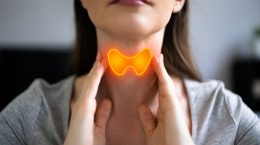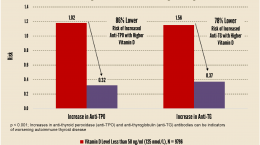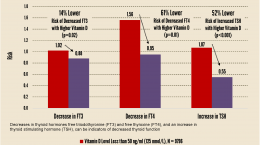Published on January 10, 2024
What does the published research say about vitamin D and thyroid function, especially for Hashimoto’s patients? Learn and share for January’s Thyroid Awareness Month
Key Points
- A study by Mirhosseini et al. in which vitamin D supplementation was given to 11,017 wellness program participants (average dose 6000 IU/day) with the goal of achieving a vitamin D level of at least 40 ng/ml (100 nmol/L) found that anti-thyroid antibody levels that were elevated among participants at the beginning of the study significantly decreased after participating in the vitamin D supplementation program; for those at-risk for autoimmune thyroid disease at the beginning, more than 60% were no longer considered at-risk at follow-up
- A recent randomized controlled trial among Hashimoto’s patients found that increased vitamin D levels were negatively correlated with TSH, TGAb, and TPOAb levels, and positively correlated with FT4 levels; there was no significant correlation between vitamin D level and FT3
- A meta-analysis of data from eight randomized controlled trials on vitamin D supplementation among Hashimoto’s patients found that supplementing with vitamin D significantly reduced the levels of both TPOAb and TGAb
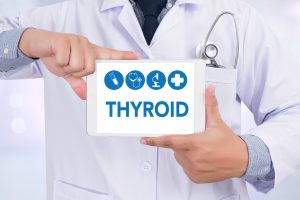 Vitamin D has proven to be of particular importance to thyroid health. Several studies have found a direct effect of vitamin D supplementation on thyroid function, as well as significant associations between vitamin D levels and the levels of thyroid hormones and thyroid antibodies.
Vitamin D has proven to be of particular importance to thyroid health. Several studies have found a direct effect of vitamin D supplementation on thyroid function, as well as significant associations between vitamin D levels and the levels of thyroid hormones and thyroid antibodies.
Before reviewing these studies, however, let’s start with a quick overview of several important markers that are used to assess thyroid function and health.
Important Measurements for Thyroid Function
The following blood tests are important when assessing the health and function of the thyroid gland.
Thyroid Peroxidase Antibody (TPOAb) – Thyroid peroxidase (TPO) is an enzyme used by the thyroid gland to make the thyroid hormones triiodothyronine (T3) and thyroxine (T4). TPOAb is one of the antibodies formed by the immune system in autoimmune thyroid disease; higher levels can indicate worse disease.
Thyroglobulin Antibody (TGAb) – Thyroglobulin is a protein found in the thyroid gland. The presence of thyroglobulin antibodies can be another indication of autoimmune thyroid disease.
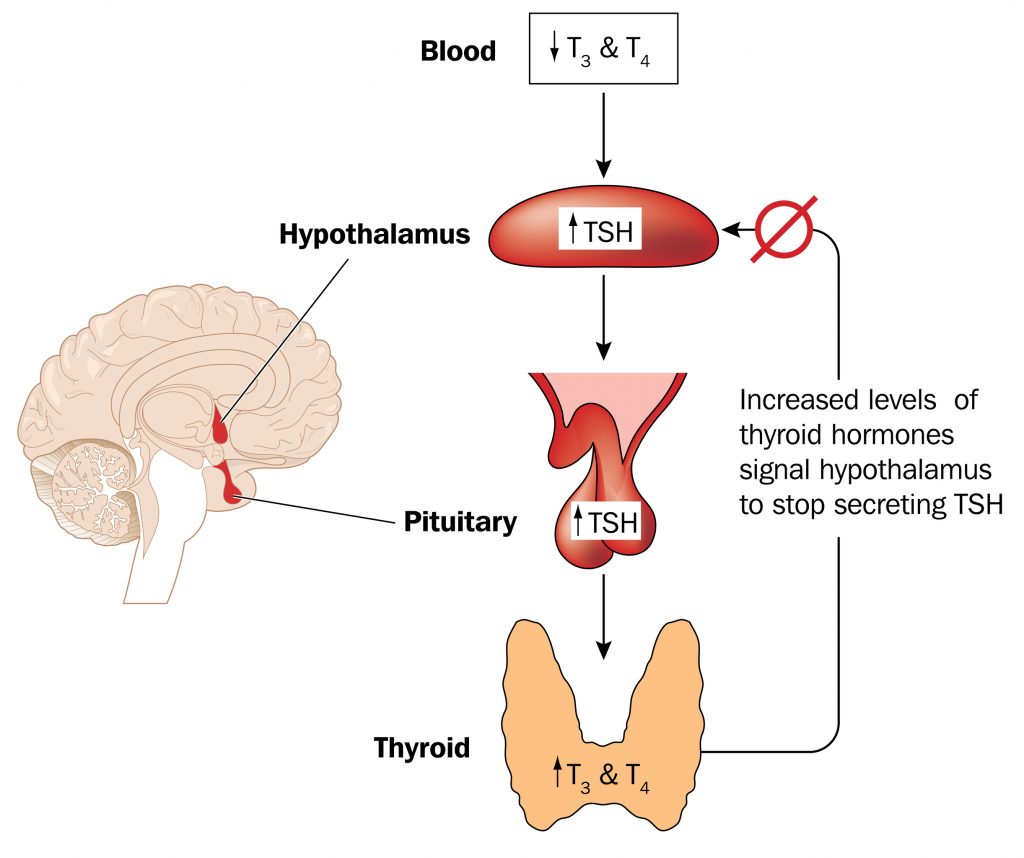
Free Triiodothyronine (FT3) and Free Thyroxine (FT4) – T3 and T4 are the two major hormones made by the thyroid gland. Free T3 and Free T4 are often measured to determine the status of these two hormones, which is a reflection of thyroid function. Results that come back either high or low can be indicative of thyroid disease.
Thyroid Stimulating Hormone (TSH) – Thyroid Stimulating Hormone (TSH) is made by the pituitary gland to stimulate the thyroid to produce T3 and T4. A high TSH level can be indicative of an under-active thyroid (hypothyroid), while a low TSH level can indicate an over-active thyroid (hyperthyroid). Measuring TSH is the best way to initially assess thyroid function, however, all of the above should be considered to make a proper diagnosis in the case of thyroid disease.
Your TSH level can be measured along with your vitamin D level through GrassrootsHealth by adding it as an option in the custom kit builder here.
The Effects of Vitamin D on Thyroid Health Demonstrated Among 11,017 Patients
We previously reported on a study by Mirhosseini et al. in which vitamin D supplementation was given to 11,017 wellness program participants (average dose 6000 IU/day) with the goal of achieving a vitamin D level of at least 40 ng/ml (100 nmol/L). Vitamin D and thyroid measures (including TSH, FT4, FT3, and thyroid antibodies) were taken at baseline and at follow-up, about one year later. The effects on thyroid function markers were substantial!
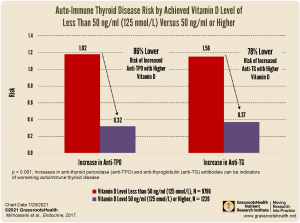 Average anti-thyroid antibody levels among the participants were elevated at the beginning of the study, but significantly decreased after participating in the vitamin D supplementation program. Among those whose anti-thyroid antibody levels were elevated at the start, anti-TG levels normalized among 77.5% by follow up (with a 78% decreased risk of elevated anti-TG for those achieving 50 ng/ml vitamin D or higher, p<0.001), and anti-TPO levels normalized among 42.2% by follow up (with an 86% decreased risk of elevated anti-TPO for those achieving 50 ng/ml vitamin D or higher, p<0.001).
Average anti-thyroid antibody levels among the participants were elevated at the beginning of the study, but significantly decreased after participating in the vitamin D supplementation program. Among those whose anti-thyroid antibody levels were elevated at the start, anti-TG levels normalized among 77.5% by follow up (with a 78% decreased risk of elevated anti-TG for those achieving 50 ng/ml vitamin D or higher, p<0.001), and anti-TPO levels normalized among 42.2% by follow up (with an 86% decreased risk of elevated anti-TPO for those achieving 50 ng/ml vitamin D or higher, p<0.001).
For those at-risk for autoimmune thyroid disease at the beginning of the study, more than 60% were no longer considered at-risk at follow-up. Read more here
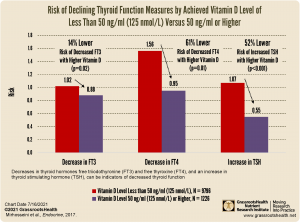 In terms of thyroid function, the study found a 30% reduced risk of hypothyroidism among participants whose vitamin D level was 50 ng/ml (125 nmol/L) or higher. Vitamin D levels below 50 ng/ml (125 nmol/L) were related to
In terms of thyroid function, the study found a 30% reduced risk of hypothyroidism among participants whose vitamin D level was 50 ng/ml (125 nmol/L) or higher. Vitamin D levels below 50 ng/ml (125 nmol/L) were related to
- an overall increased risk of low thyroid function and thyroid disease
- a 107% increased risk of elevated TSH
- a 60% and 14% lower risk of low FT4 and FT3
Does Vitamin D Affect Thyroid Function Among Hashimoto’s Patients?
Hashimoto’s thyroiditis is an autoimmune disease affecting the thyroid. Signs and symptoms include an enlarged thyroid gland, increased circulating thyroid antibodies (Thyroid Peroxidase antibody (TPOAb) or Thyroglobulin Antibodies (TGAb)), fatigue, weight gain, joint and muscle pain, dry skin and hair, heavy or irregular menstrual periods, fertility issues, constipation, and other symptoms associated with an under- or over-active thyroid. In most cases, Hashimoto’s disease leads to hypothyroidism (an under-active thyroid), but in rare cases, it can lead to hyperthyroidism (an over-active thyroid).
A recent study by Jiang et al. was published in October of 2023, titled Therapeutic effect of vitamin D in Hashimoto’s thyroiditis: a prospective, randomized and controlled clinical trial in China.
This randomized controlled clinical trial included 179 female patients, ages 12 to 75 years old, who were newly diagnosed with Hashimoto’s disease. Participants were randomly assigned to either the treatment group or the control group; those in the treatment group were further randomized to either receive 800 IU of vitamin D per day only (N=49) or vitamin D in combination with Levothyroxine (a drug commonly prescribed for an under-active thyroid; N=44). Blood markers for thyroid function and autoimmunity were measured at baseline and again after the 6 month trial.
After 6 months, there were statistically significant improvements observed in both treatment groups compared to the control group. Overall,
- TPOAb levels decreased
- Free Triiodothyronine (FT3) and Free Thyroxine (FT4) levels increased
- 25(OH)D levels increased
- Thyroid-Stimulating Hormone (TSH) levels decreased
The authors also found that increased vitamin D levels were negatively correlated with TSH, TGAb, and TPOAb levels (these levels decreased as vitamin D levels increased), and positively correlated with FT4 levels (levels increased as vitamin D levels increased). There was no significant correlation between vitamin D level and FT3.
While the dose of vitamin D given in this study was small, the authors concluded
“VitD supplementation can effectively slow progression of hypothyroidism, improve thyroid function, and reduce the anti-thyroid antibody level. This suggests it is useful for Hashimoto’s Thyroiditis.”
Meta-analysis also Shows Effect of Vitamin D for Hashimoto’s Patients
A 2021 systematic review and meta-analysis by Zhang et al. examined the effects of vitamin D supplementation on thyroid autoimmunity markers among patients with Hashimoto’s thyroiditis.
The authors looked at data from eight different randomized controlled trials (N=652) to see what effect vitamin D supplementation had on levels of thyroid peroxidase antibody (TPOAb) and/or thyroglobulin antibody (TGAb). Study periods ranged from 4 to 24 weeks. The authors found that, overall, vitamin D supplementation significantly reduced both TPOAb and TGAb. A sub-analysis found that supplementing for a duration of 3 months or less did not have a significant effect on TPOAb – indicating the time it may take for vitamin D to have an effect, and the importance of maintaining a daily vitamin D routine.
Test to See if You Are Getting Enough Vitamin D and Other Important Nutrients – Include Your TSH Levels Too!
 Create your custom home test kit to measure your levels at home as part of the D*action project!
Create your custom home test kit to measure your levels at home as part of the D*action project!
With your kit you can measure your:
- Vitamin D
- Magnesium PLUS Essential and Toxic Elements
- Omega-3 Fatty Acids
- hsCRP
- HbA1c
- TSH
- Type 1 Diabetes Autoantibodies
Did you know that each of the above can be measured at home using a simple blood spot test? As part of our ongoing research project, you can order your home blood spot test kit to get your levels, followed by education and steps to take to help you reach your optimal target levels. Start by enrolling and ordering your kit to measure each of the above important markers, and make sure you are getting enough of each to support better mood and wellbeing!
Create your custom home test kit today. Take steps to improve the status of each of these measurements to benefit your overall health. With measurement you can then determine how much is needed and steps to achieve your goals. You can also track your own intakes, symptoms and results to see what works best for YOU.



